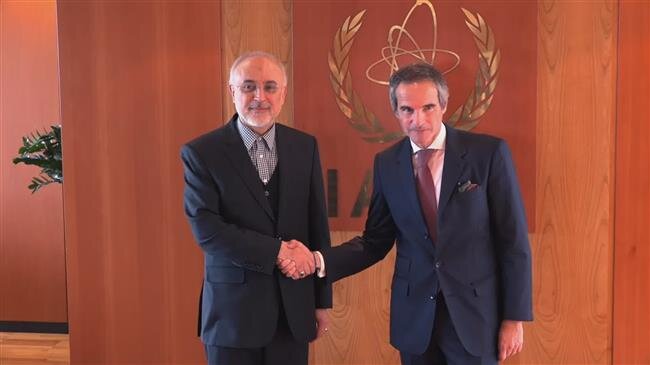Iran will never decide under pressure: Salehi

TEHRAN - The head of Iran’s Atomic Energy Organization (IAEO), Ali Akbar Salehi, said on Tuesday that his country believes in logic and negotiations but will never make any decision under pressure.
Salehi made the remarks in a meeting with Rafael Mariano Grossi, director general of the International Atomic Energy Organization (IAEA) in Vienna.
Salehi was in Vienna to attend an international nuclear security conference.
Salehi, a nuclear physicist, further said that the IAEA's decisions should not be politically-tainted.
Also on Monday Salehi said if China did not help Iran to redesign its Arak nuclear reactor, Tehran would restore the previous one.
“If the project, due to U.S. disruption and Europe’s shortcoming, is not implemented (by the Chinese contractor) Iran may inevitably return to the previous design of Arak’s Khondab heavy water project,” Salehi said in a meeting with his Chinese counterpart in Vienna.
They further exchanged views over mutual cooperation, especially over renovating and redesigning the Khondab reactor.
Salehi added that other signatories to the Joint Comprehensive Plan of Action (JCPOA) should assist more seriously to implement the mentioned project to counter the U.S. unilateralism.
According to the 2015 nuclear deal, known as the JCPOA, Iran is entitled to “redesign and rebuild a modernized heavy water research reactor in Arak, based on an agreed conceptual design, using fuel enriched up to 3.67 %, in a form of an international partnership which will certify the final design.”
In November 2015, the document on redesigning the heavy water reactor was signed by all parties to the JCPOA.
The JCPOA, better known as the Iran deal, was signed between Tehran and the 5+1 group -- the five permanent members of the UN Security Council - and Germany - in July 2015 and went into effect in January 2016. The UN Security Council also adopted resolution 2231 endorsing the international agreement.
However, U.S. President Donald Trump, a stern critic of the landmark deal, unilaterally pulled Washington out of the agreement in May 2018, and unleashed the “toughest ever” sanctions in history against the Islamic Republic in defiance of global criticism. The move was intended to strangulate the Iranian economy, especially through a total ban on Iran’s oil exports.
Under Washington’s pressure, the three European signatories to the JCPOA have so far failed to protect Tehran’s business interests under the deal.
In May 2019, exactly one year after the U.S. quit the deal and imposed sanctions on Iran, Tehran began to gradually reduce its commitments under the JCPOA to both retaliate for Washington’s departure and Europeans’ failure to honor their commitments.
On January 5, Iran took a fifth and last step in reducing its commitments and said it would no longer observe any operational limitations on its nuclear industry, whether concerning the capacity and level of uranium enrichment, the volume of stockpiled uranium or research and development. However, Iran has insisted if the Europeans honor their obligations it will immediately reverse its decisions.
EU foreign policy chief Josep Borrell has said that Europe must ensure Iran’s benefits from the nuclear deal if it wants the deal to survive.
“If we want the Iran nuclear deal to survive, we need to ensure that Iran benefits if it returns to full compliance,” he wrote in an article in the Project Syndicate published on Saturday.
Borrell visited Iran on Feb. 3. He held talks with Foreign Minister Zarif, President Rouhani and Parliament speaker Ali Larijani.
MJ/PA
Leave a Comment